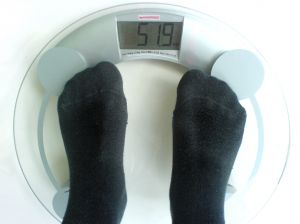By Rita Brhel, managing editor and attachment parenting resource leader (API)
 As attachment parents, we need to be sure that we love and accept our children no matter what – and this includes their weight. Some children are naturally, genetically, more overweight or underweight than other children, and this is OK. The reason for the national media attention on children and their weight management is because of the high rates of obesity not only among adults but among children, as well.
As attachment parents, we need to be sure that we love and accept our children no matter what – and this includes their weight. Some children are naturally, genetically, more overweight or underweight than other children, and this is OK. The reason for the national media attention on children and their weight management is because of the high rates of obesity not only among adults but among children, as well.
Obesity is defined as being 20% above the ideal weight for height. Excess body fat puts children at risk for a number of serious health concerns including Type 2 diabetes, high blood pressure, obstructive sleep apnea, and bone and joint disorders. Recent studies have found possible links with liver and kidney disease, and cancer. Obesity also puts kids at increased risk for low self esteem, which can later contribute to depression, anxiety, or other mental illnesses. Many experts and resources agree that childhood obesity is of epidemic proportions.
While genetics plays a role, the main culprit is an unhealthy diet of high fat and sugary foods and unhealthy behaviors, such as physical inactivity or emotional eating. Attachment parents need to remember their role in teaching children to choose nutritious foods and healthy eating patterns.
 According to La Leche League International’s Whole Foods for Babies and Toddlers by Margaret Kenda, parents shouldn’t be overly concerned about weight management in their babies. Even among babies and young children who seem overweight, most of them will grow into their excess weight if they eat a good diet and stay physically fit. It’s when children grow into their adolescent years that they’re at risk for obesity: “Of overweight children at ages 4 and 5, only about 20% will grow up as overweight adults. But wait until the child is in junior high school, and the risk has risen to more than 75%,” explains Kenda.
According to La Leche League International’s Whole Foods for Babies and Toddlers by Margaret Kenda, parents shouldn’t be overly concerned about weight management in their babies. Even among babies and young children who seem overweight, most of them will grow into their excess weight if they eat a good diet and stay physically fit. It’s when children grow into their adolescent years that they’re at risk for obesity: “Of overweight children at ages 4 and 5, only about 20% will grow up as overweight adults. But wait until the child is in junior high school, and the risk has risen to more than 75%,” explains Kenda.
Preventing childhood obesity is easier than treating it, and here are a few tips from Kenda on how to curb the risk that your baby will have to deal with obesity later in life:
- Don’t worry about a baby who seems a little overweight but who is normally physically active, especially if you’re breastfeeding. Some fat is healthy, especially for babies and young children. Fat is needed for brain and nerve development, as well as temperature regulation and energy reserves during illness and stress. Most babies are overweight only temporarily.
- Focus on improving your child’s nutrition through a healthy, balanced diet rather than cutting out calories or feedings. Dieting is risky for infants; there is fine line between good nutrition and malnutrition, and babies and young children need plenty of variety of nutrients, including fat, for their development.
- Keeping a happy feeding atmosphere is more important than food. The one factor that most drives obesity or other eating disorders is when a child begins to focus too much on eating. An attached child will learn how to look at food and nutrition from her parents, and parents who are overly concerned can produce anxiety in their children who then begin to try to control the situations themselves, through overeating or starvation.